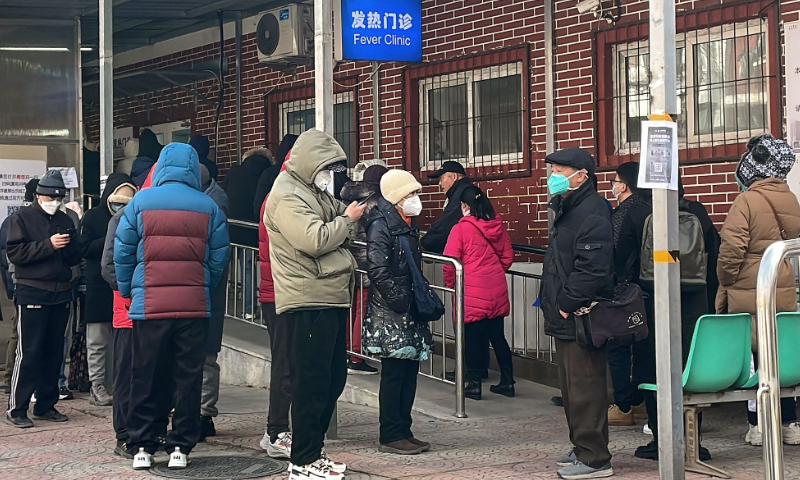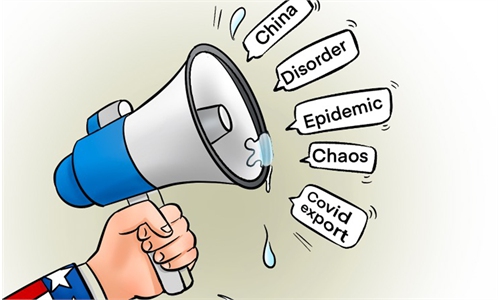
People queue outside a fever clinic in Beijing on December 14, 2022. Photo: VCG
Omicron has spread like a tsunami in Beijing. Since people aren't doing nucleic acid testing anymore, relevant authorities don't have accurate data on how many people have been infected. Based on observations, people tend to believe that there have already been millions of infections so far. Some nongovernmental estimations based on big data claimed that by December 13, 38 percent of Beijing's population had already been infected. This is a bold figure, and the actual statistic may not be as high. But there is no doubt that Beijing's spread of the epidemic has peaked and this peak may last for about 10 days from now, after which the number of infections will gradually decline.
The spread of Omicron across Beijing is definitely one of the most intense in the world right now. Fortunately, there are very few severe cases, and the number of deaths is in the single digits. This shows that two basic judgments are correct.
First, although the new mutant strain of Omicron has a strong transmissibility, its pathogenicity has been greatly reduced. Most people have a fever for two to three days after infection, but recovery is swift and takes about a week. Beijing announced on December 13 that there were a total of 50 severe and critically ill patients in hospitals in the city. This ratio is very low, so the vast majority of people choose to quarantine at home.
Second, the high vaccination rate in China has played an amazing protective role and successfully suppressed the occurrence of severe cases. The complete vaccination rate of the entire population in China now exceeds 90 percent.
Whether it be in China or abroad, there are some voices that said the easing of China's COVID policy was "too sudden" and the country was caught off guard. However, in fact, China's change of course has maintained a strategic rhythm. We have insisted on high-intensity epidemic prevention for three years, buying time for the virus's fatality rate to drop and for more people to get vaccinated. In fact, since the fall of this year, it has generally been believed that the country would loosen the lockdowns, and it's only a matter of time. The violent spread of the virus since the beginning of winter is one of the factors that drove China's change of course. However, the change is within expectations and natural. Various regions in China are actively exploring loosening COVID policies as it is increasingly costly for them to main the dynamic-zero policy. Although the measures various regions have adopted are not always the same, the pace of change is not surprising and it is made based on the results of three-year dynamic-zero policy.
After the policy change, the shockwave across Beijing was intense, exceeding most people's expectations. There were long queues for fever clinics in hospitals, and related medicines were out of stock in pharmacies, but all these problems occurred in a relatively mild way. Some people panicked and hoarded medicines, causing a shortage of medicines, but these medicines were redistributed among people through channels such as relatives, friends, and colleagues. So although everyone complains that they can't get medicine, in reality there are very, very few people who really can't get medicine when they have a fever. This doesn't constitute a large-scale problem.
Therefore, public sentiment in Beijing is generally stable. Some people complain on the internet, but there is no real collective complaint about the government's work. Everyone has seen the rapid spread of the epidemic, and understands the short-term shortage of fever clinics and medicines, and most people believe that the shortage of medicines will end soon. In fact, this problem has started to loosen across the last two days.
The real situation is that the epidemic had spread violently, but the government has laid a solid foundation for fighting the epidemic in the past three years, and most people have a general understanding and support for the adjustment of the epidemic prevention policy. Therefore, despite temporary difficulties and disturbances, Beijing and the whole country have established a consensus to move forward resolutely. Although there are criticisms from some radicals on the internet, they are nostalgic for the dynamic-zero policy, and they do not constitute mainstream opinion. Undoubtedly, Chinese society has maintained great unity around the prospect of changing the COVID policy.
Beijing is the capital of China. After the change, the most difficult situation has come to Beijing. However, the city has not flinched. It is of great significance to the whole country that the people are going through the difficult times with the government together. If the same situation happens in a remote province, policy adjustments may come slowly, and central cities such as Beijing may continue to maintain the dynamic-zero policy. But the biggest challenge occurred in Beijing, which eased the COVID policy in a realistic manner. Although the peak of infections across the country has not yet arrived, Beijing has led the country through a psychological transition.
On Tuesday, Shanghai announced the cancellation of all epidemic risk areas, and the city has entered a normal epidemic prevention stage. Shanghai is the first central city in the country to make such an announcement. This means that the special epidemic prevention stage has come to an end in Shanghai. Many technical means in China, such as the itinerary code which the telecommunications companies use to supervise all inter-provincial travel, were cancelled, and all its data will be destroyed. Although it still needs a process, Beijing and other northern cities are far from overcoming the difficulties, and southern cities may also be affected. The Chinese people have indeed passed the hurdle of the epidemic psychologically, and we are moving toward a new life.
The author is a Global Times commentator. opinion@globaltimes.com.cn


